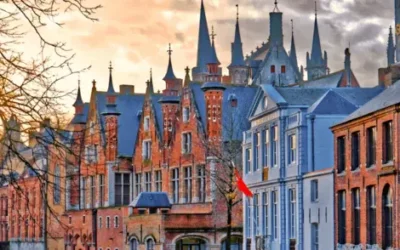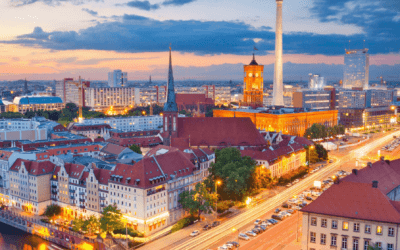Dateline: Tbilisi, Georgia
I’ve long held the belief that truly adventurous and smart investors should take advantage of the opportunities in the world’s last frontier markets in Africa.
Over the past couple decades, many African countries have experienced economic reforms that have made them much more attractive business destinations. For one, Africa is experiencing some of the greatest economic growth in the world. In the early 2000’s, African countries delivered 14% yearly returns on investment. And, in the wake of the global financial crisis, 9 of the 15 fastest growing countries in the world are currently in Africa.
The level of growth yet to come is explosive and exciting. As I’ve said before, getting in now will be one of the wisest investments of this century.
However, many businesses and investors are still relatively unaware of the opportunities in Africa. One reason for this is that it’s often difficult to find good information without actually being on the ground in the middle of all the action.
I plan on visiting several African nations later this year, but until then, I am doing my research. I recently interviewed Kathrin Freitag, a German studying International Business in Maastricht, the Netherlands. She is currently in Nyeri, Kenya, laying the groundwork for a new incubator center, “Starters Valley”.
Kenya is home to the fastest growing economy in Africa, the largest economy in East Africa, and the third fastest growing economy in the world. It even made it onto our list of the five best countries in Africa to invest in. It is the regional headquarters for virtually all multinational brands in the surrounding region and the capital, Nairobi, is the largest city between Cairo and Johannesburg.
Kenya has a young, highly-educated, English speaking workforce. In response to such promising demographics, Kathi and her business partner Julia have created their incubator center in Nyeri, Kenya to give young innovators and entrepreneurs a place to learn, share experiences and grow as an entrepreneurial community. On their crowdfunding campaign page they explain:
Besides providing them with basic facilities such as co-working spaces, computers and internet, we will give seminars and workshops as well as offer a program they can participate in. The first part of the program takes 3 months where they get taught business basics. In the second phase, which will take 6 months, they can then start their own social business with our help and guidance.
Through this experience, Julia and Kathi have gained important insights into the business atmosphere in Kenya. Read on to learn more about their incubator program and the recommendations Kathi has for anyone looking to start a business in this promising frontier economy.
The Interview
Andrew: Tell me a little bit about the One Percent Club, how you got involved, and what you’re doing with them.
Kathrin: Basically, I was asked by Nando Ngandu — who is the founder of Smile to the Future, a non-profit organization from Maastricht — he asked me to join him for an idea he had to set up an incubator program in Nyeri, Kenya. In order to set up the project there was, of course, some funding required. He was actually the one who suggested to do a crowdfunding campaign.
When I was looking for a different website I had to make a decision, if I was going to go with a German website or a Dutch website. I myself study in Maastricht, Netherlands so it would actually be nice to go with the Dutch website to address as many people as possible. Nando had already done some crowdfunding campaigns with the One Percent Club, so that’s why my friend and I basically decided to go with them.
We had the idea to make it a different type of crowdfunding campaign, not just your usual small video and rewards. We wanted to find special rewards for the people who donated, so we set up a system where the people who donate give us a certain task that we have to fulfill. In addition to this task, they also get a promise coin. The promise coin symbolizes the trust we want to develop between the people who donate and us.
We’ve seen that a lot of people are hesitant to donate to organizations like UNICEF or others as they don’t know where the money really goes. So we had a friend of mine design a 3D printed coin, half of it goes to the person who donates and the other half goes to the entrepreneur in Kenya. It’s all part of the creative program we are trying to set up here.
Andrew: So it’s you and Julia Barth and you’re both studying in the Netherlands, and this Incubator project “Starters Valley” is in Kenya. Why did you decide on Kenya? A lot of people go to Barcelona, Ho Chi Minh City or Bangkok, so why Kenya? What brought you there?
Kathrin: My friend Nando Ngandu, as I mentioned before, has a lot of experience with Kenya. He knows the people and has been here for quite a few years. He has the experience around it and we wanted to combine that experience with our business knowledge and our motivation to do something good.
I’ve personally never been to Africa until now. We thought it would be a good experience for Julia and me to try out this combination of setting up an incubator center in a country where somebody already has experience and we can bring our new perspectives from Europe.
More importantly, 60% of Kenyans are under 24 years old and live in remote communities with poor infrastructure and a focus on agriculture. This prevents the young locals from actually taking on jobs beyond the scope of farming. We would like to give aspiring young locals a place to share their experiences, to learn and to become entrepreneurs through a self-reliant and sustainable incubator center in the heart of Nyeri Town.
So, together with Nando Ngandu’s Dutch non-profit organization “Smile To The Future” (which has already set up several projects in Kenya), we can combine our knowledge about the country and passion for entrepreneurship to make this project a great success. That’s the reason why we decided on Kenya itself.
Andrew: When you say new perspectives from Europe, obviously different business cultures have different things going on. What are some of the things that you think you can bring from your backgrounds in Western Europe down to Kenya that would help the people starting businesses?
Kathrin: We can especially bring the expertise and the quality of the program. Of course we operate in a completely different way. Like here, marketing is different. The thing is, what we realized when we started working with people here is that they all want to operate on an international level. But the quality of education isn’t at the standard that it needs to be to compete on this level.
As Germans we can bring some level of efficiency and punctuality. We try to really prepare the people for the international market. So with the quality of knowledge they receive from the program they can be able to compete in this international environment.
Andrew: It sounds like things aren’t as developed in Kenya. Is there a specific example of things you think you could improve? Like marketing, for example, how is marketing more advanced in Europe? What would you want to take to Kenya?
Kathrin: If you’re in Kenya and you want to do marketing, you don’t do as much social media, for example, like in Europe where everything is done online. It’s coming up. You see a lot of development, especially where I’m at here in Nyeri. The development in Nyeri within the past five years has seen their infrastructure increase, people use computers more and internet more.
It’s a fast development, but still people do a lot of mouth to mouth marketing. You have to go to the streets, you have to go to churches and to schools to talk to the people. One person knows someone and they know another person. That is how you build up a huge network, but that takes time. I would like to actually introduce them to how to market their stuff online because it’s an up and coming trend which they also have to go with — especially if they want to compete in an international environment.
Another thing we can help them with in marketing are their presentation skills. What I’ve figured out here is that there are some people with really good presentation skills, but they just work with words and their hands and they just stand there and speak. I would like to teach them how to present themselves in a more efficient and better way. After all, if you just talk and talk without visuals behind you, people will very quickly forget what you said.
Little things matter, too. For me, especially, a lot of women don’t dare to speak up. It just starts with the volume of the voice. They’re so quiet that even if they’re right in front of you it’s difficult to understand them. So, in terms of marketing, presentation skills are one way to efficiently market as well as do business.
Andrew: Tell me a little about Nyeri. How far is it from Nairobi? What is different about it than Nairobi? Because, obviously, Nairobi is kind of trying to become an African financial center. Talk about the difference between the two cities.
Kathrin: There are two main differences between Nairobi and Nyeri. First of all, Nairobi is the business and financial hub of Kenya and East Africa. It has a higher velocity of money and is more international than Nyeri, attracting many foreign companies and organizations with its business opportunities. However, the capital is very expensive and highly competitive compared to Nyeri.
Second, from a political perspective, Nyeri is regarded as very peaceful, as the population mostly focusses on their own business rather than participating in political revolts, being afraid that such actions might affect their properties and businesses. This mindset is typical for the local people, most of them being “Kikuyu” (Kenyan tribe). They mind their own business and are very hard-working entrepreneurs, always looking for business potential. In contrast, Nairobi’s population is split into various tribes and, in times of political campaigning, those tribe rivalries turn the city into a very dangerous place to be.
Now that there are streets, the connecting road from Nairobi to Nyeri is over 100 kilometers. It takes about 3 hours to go from Nairobi to Nyeri, but of course they don’t drive as fast as we do in Germany, so it would probably take us about 1.5 hours.
Slowly but surely, the trend is that Nyeri will be more and more developed. People will come and move into town and infrastructure will get better. It’s expected to grow a lot in the next 15 years.
Andrew: What do you see in Kenya in terms of growth? Among African countries, Kenya’s one of the few that’s doing some of the right things. Tell me about some of the rapid growth you’re seeing and where you think things will be in ten years as a result.
Kathrin: Around 5 years ago, Nyeri’s infrastructure lacked basic facilities such as proper roads, electricity, water and internet. In addition, industries such as business and leisure tourism, agriculture and trading have boomed, leading many national and international companies to open up their offices in the city.
Nyeri has also developed to be a center of education — second place after Nairobi — offering great academic programs by the best universities in the country. Because of the safe environment and rise in job opportunities, the population of Nyeri will increase as well as its middle income class having more income surplus to spend. Living standards will also improve. Even though living expenses might rise slightly, in comparison to Mombassa and Nairobi it will still be cheaper to live in Nyeri.
Concerning the infrastructure, the government plans to market Nyeri as the most central point between Isiolo and Nairobi, extending railway, pipeline and the roads passing through Nyeri, turning the city into a business hub. Furthermore, the private airport close to Nyeri will be expanded for transportation of agricultural products and domestic travelers.
Andrew: Do you think that most of the growth with the people in your incubator will involve infrastructure projects? That’s mostly what you see in developing world countries, like in Africa, where most of the businesses are figuring out, as you said, health care, transportation, stuff like that. Do you think that’s what it is, or are there other businesses outside of that?
Kathrin: Actually, with the incubator center, our goal was to find and help people who want to start a social business. But we figured out that the people here are interested in smaller scale businesses for now. We also have people who already have a business — for example a hotel — and they want to make that business grow.
Alos, people in Nyeri are risk takers who invest rather heavily in long-term projects such as real estate (second country in the world) and agriculture activities like coffee, tea and crops.
For now, we have to start by taking in as many people as we can to create a network. I don’t think that for now it will be on the social part. We try to promote social responsibility, but so far people are more interested in setting up a guest house or a small shop. A lot of them don’t think internationally, but we’re going to try and get this incubator program on a different scale.
Andrew: What experience have you seen with the Kenyan government and the local government in terms of wanting to help, or not being helpful or anything in that regard?
Kathrin: We actually met with the minister of education this week and she was very interested in the project and its program. She considers funding the project to enable more locals to participate. We will have another meeting this week to discuss this matter further, as well other ways of support.
It is good to see that they are interested in helping and see some value to the project. However, if we had just gone to them and said that it’s a good thing for them, I don’t think they would have bought it. We offered to train their youth so that they could see that it’s not just about them giving us money.
Also, if you work with the government you need to make sure that you offer the program to the people who are interested and who are ready to develop and grow. In our situation, we needed to involve their youth and community. What I was told is that the government gives money, but what happened in the past was that a lot of the students used the grant money, but nothing came of it. The students didn’t attain the required skills, so we want to make sure that, with the government’s help, this doesn’t happen again.
We have to prove that our money is very well put into the program to actually let the students gain skills and be able to contribute to Kenya at a later stage when the growth and money from their business is circulating.
Andrew: So they should be interested that you’re trying to create jobs.
Kathrin: Exactly. I think partly because of their bad experiences, they’re very cautious about just giving out money. But they’ve seen that we really want to do good. If the money has some affect in the end, it seems they are more willing to give some money.
Andrew: Besides money, have you found the government to be cooperative and wanting to work with you and wanting to see what you’re doing? Or have you found it to be that they don’t like foreigners
Kathrin: They wanted to see what we’re doing. A co-worker of mine had the first chat with the ministry and he was very interested in terms of “Oh, it sounds good.” But here in Kenya they’ll often say that it’s good, but it takes a long time to get results. You have to push for it. It’s not that they called us to ask more about what we’re doing, we had to push for it.
Andrew: Would you say that it’s a pretty bureaucratic country?
Kathrin: While being centralized in Nairobi, the country was very bureaucratic and it took a long time to get certain documents or permissions. People had to go through a lot of governmental procedures. However, after the decentralization in 2013, those processes take less time as counties have the authority to govern themselves to a certain extent, involving less bureaucracy.
In addition, most of the procedures are also digitalized which accelerates registration processes and or receipt of documents even more. If I draw the comparison to Germany, which is a very bureaucratic country, Kenya has a strict regulatory framework and policies to maintain control. However, it has been very easy to speed up every process so far by simply having a good chat with the people, whereas in Germany, that is not likely to happen.
Andrew: What would be your recommendation to somebody who’s interested in starting a business in Kenya? Is there something that they should do first? Should they hire someone locally to help them
Kathrin: I would definitely recommend Kenya as a place to do business. It has a lot of resources and a lot of potential, so if somebody wants to start a business here, especially from outside, I would recommend it.
In 2010, the government decided to implement a modernization of the constitution leading to a decentralization of the government which took place in 2013. Thus, before 2013, if a Kenyan needed to deal with some governmental issues, he or she had to go all the way to Nairobi. Nowadays, political and financial power is decentralized to several counties, which speeds up a lot of processes such as setting up a business.
Nyeri is increasingly considered (and advertised by the government) to be the center of the Republic, not only because of its central location, but also its political importance and its rapid economic development. Because of that, Nyeri people are very keen to do business with foreigners and accept nearly every investor as long as they know that he or she is competent, making it very easy to create a large business network.
However, if you come from outside, you’ll definitely have a few conflicts. If you’re just somebody from Europe, you’ll get a lot of attention because you are a Mzungu (Kiswahili for all white people) and people are willing to hear you, but you have to network. It’s always important to have someone here in the country who knows people and who knows how business is done here because it’s completely different.
I think it is always wise to be assisted by a local as they know norms, values and how people do business in the country of choice. Their assistance in governmental issues and finances will be especially helpful. As I mentioned, in a lot of occasions foreigners receive special treatment in Kenya, from service in restaurants to the government. In fact, the government puts high priority on any foreigner, no matter if they come from Europe or the neighboring country of Tanzania. Even so, in certain areas a local can help prevent you from paying “Mzungu” prices, which can easily be double the amount a local would pay.
When I came here I was overwhelmed with how we would deal with the differences. You should definitely plan a lot of time. You can’t say this is a deadline and this is when things will be done. No. Two weeks later, probably, things are done if you push for it. If you don’t push for it, it will probably take longer. So be sure that you get someone, but also be sure that you have someone who’s reliable.
It’s something that you need to build up, so just coming here and setting up a business doesn’t work. You need to probably come here for yourself for a while. Get to know people, get to know maybe some politicians as well, people who have some kind of power to get you the right people to help you out. If you create a network here, you should be good to go.
On a lighter note, the weather in Nyeri is very similar to the one in central Europe, which I guess might brighten some investors’ mood as they do not have to deal with the unbearable prevailing heat in the other parts of the country.
Andrew: Can you meet politicians and people like that pretty easily?
Kathrin: Yes. I was talking today with the director of the college and he’s a politician himself. He was with the president a couple of weeks ago and he said that if you’re a Muzungu you would easily be able to go and see the president. That’s what he told me. I have not seen the president myself, but it’s just as an exaggeration that shows that it’s easier if you’re white.
The way people treat you on the street, they always treat you as if you were something special. You always get special treatment, although it’s not necessary. But they know that you bring the money to the country. Even if it’s just a small shop owner, they need the money. Or if it’s a politician at the ministry, they know that with your business you will bring money, so they are willing to help you.
Andrew: Do you feel pretty safe there?
Kathrin: Yeah. During the day I could walk around here alone. Not in Nairobi though. If you’re just a group of girls, walking around in Nairobi can be very dangerous. Here in Nyeri I don’t think it’s dangerous, but I wouldn’t push it in that sense. During the day we walk together, during the night we take a cab or something like that.
Andrew: When will your incubator be opening and what do you expect to happen in this first year?
Kathrin: According to our plans, it should have actually started. However, we realized quickly that things take much longer here than we expected. We have a co-worker who’s been here for two months already and we first had to figure out the market situation and then we realized the program was a bit too expensive and that’s when we started trying to get government funding.
The volatile nature of the project let us encounter quite a few difficulties and delays from the beginning, which makes it quite difficult to predict the future of the project. However, in one year’s time, we want the project to be self-reliant and well-known in the area for its great academic program — which, by then, should have already helped a lot of participants to have successfully set up their business during a period of 10 months.
Furthermore, with additional funding from various sources we would like to move from our current location at Dexter International College to our own building. We will provide additional facilities such as co-working spaces, internet and rooms for seminars and other activities, creating an innovative and inspiring hub for an aspiring entrepreneurial community full of ideas and willpower to conquer the business world.
We’ll hopefully start with the program itself in the next month. We have the program outlined and we are about to hire more teachers. We think it’s realistic to get 60 students for the first program and then we’ll see where we go from there.
Andrew: Will everyone you’re working with be local and from Kenya?
Kathrin: Mostly yes. We work together here with Dexter International College and the director of the college will also partly oversea the operations of the incubator program. In addition, we are now about to hire one of the teachers here from the business department and he will be at the head of the incubator program. We also want to start training the teachers here and we will have a guideline that will ensure a certain quality standard.
From the organization Smile to the Future we will bring volunteers to Kenya. We want to bring as many as possible. We’ll also be working next week on making the stay for the volunteers cheap so we have a house where they can stay. But, by getting as many volunteers as possible, there will be people who can work from here to keep the project going. But we also try to maintain the local people because they are the ones who will keep on working on the project.
Andrew: Is there a website?
Blog: http://kathrintfreitag.wixsite.com/startersvalleykenya
Campaign: https://onepercentclub.com/en/projects/starters-valley-kenya/plan
Partner: Smile to the Future









